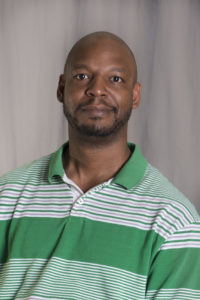With Commencement approaching on June 1, Spalding is publishing a series of stories and Q&A’s that highlight students from a range of degree programs who are set to graduate. Next up is Jerre Crenshaw, who is receiving the degree of bachelor of arts in interdisciplinary liberal studies.
After Jerre Crenshaw transferred to Spalding University in 2016, she immediately sought out a organization on campus where she could discuss social issues pertaining to the black community.
When she realized one didn’t exist, she worked to create one herself.
Crenshaw is the leader of the Black Student Alliance that officially formed last fall, and she said helping make it a reality is a proud accomplishment that she’ll take with her when she graduates this weekend.
“I knew Spalding’s mission statement says it is diverse community of learners, so when I came to Spalding, I knew that was exactly what I wanted to do,” she said.
Crenshaw said she got approval and encouragement across the board from Spalding faculty and administrators when she sought to create a Black Student Alliance, and she said the organization now has at least 10 active members who take part in programs and events on Spalding’s campus and on other campuses.
Additionally, Crenshaw said she is excited to be one of the first students ever to graduate from Spalding having earned the new minor in African-American Studies. The creation of the BSA served as the praxis credit for the AAS minor.
“Sometimes in school you don’t hear history that pertains to you when you’re a person of color, so having that opportunity to really learn more about myself culturally as well as other African Diaspora people was really important to me,” she said. “I’ve really been happy with the courses I’ve been able to take. They’ve really widened my horizons and opened up my mind to new possibilities of thinking and viewing the world.”
Crenshaw, an alumna of the Academy of Shawnee, has enjoyed being in the liberal studies program at Spalding, saying all her professors have been “very compassionate and genuine and helpful.”
They’ve supported both her academic career, she said, “and me developing as a decent human being who critically thinks and questions things thoroughly.”
After earning her bachelor’s, Crenshaw plans to attend graduate school, and she would like to pursue a career in population health, providing resources that help eliminate health inequities for people from certain socioeconomic backgrounds.
“With Spalding being the first certified compassionate university,” she said, “I think it showed me the value of systematic compassion and that compassion can be implemented into a system. That was initially a thought that was far away from me, but it’s been contextualized by being here.”
Here’s more from Jerre Crenshaw …
What’s your favorite Spalding memory?
My first day of class, it was over the summer and burning up hot, and I went to the wrong building and sat there for 20 minutes until I realized, “Maybe I’m in the wrong spot,” and looked up the addresses. But it’s my favorite memory because I ended up in the Mansion, which turned out to be one of my favorite spots on campus. It kind of reminds me of my high school with the wooden fixtures. So I discovered my favorite place.
Which accomplishments are you most proud of from your time at Spalding?
The creation of the BSA, of course. Being able to be senator of liberal studies this year and last year. And I think I’ve really improved as a responsible person and citizen.
What is your favorite spot on campus? The Mansion, as you said earlier?
Yes, the Mansion, right by the piano. Shawnee is an old building, so you can hear the creaks when you walk, and I got used to doing work in that kind of space, and I really missed it. It kind of brought me home away from home (to be in the Mansion).
At Spalding, we like to say that, “Today is a great day to change the world.” For many of our students, Commencement is a world-changing experience. After graduation, how do you plan to change the world, big or small, and who inspires you to be a #spaldingworldchanger?
I want to take my skills into the development of compassion as a system and take it to the outside world. So I’ve been looking at volunteering with the Big Brothers Big Sisters or through the judicial system and with kids who are in foster care. I want to be a part of giving people the space to be an individual, like Spalding has done for me.
My mom inspires. I come from a family of six. I’m the fourth-oldest. There are three girls, three boys. I’ve always seen my mom as a caring, strong person who really cared about being there for other people when they needed help, even if she didn’t know them. She’s one of those people who will stop to help an elderly person cross the road, or she’ll stop and pick up trash off the ground for other people. I always would think, hmm, I want to be mindful like that, even when I have other things going on around me. Having six kids is a lot, and she still stops to think, ‘What if someone steps on this? I better grab that.’
Anything else you’d like to share about your experience at Spalding?
I’m just really satisfied with my experience here, and I think it developed me as a person, and I got to meet a lot of great individuals who really helped me along my journey.
